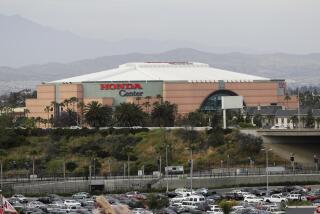Japan Auto Workers Trim Pay Gap
- Share via
TOKYO — Japanese auto workers have won pay hikes that, thanks to a 34% appreciation of the yen since last fall, will bring their base pay up to about 88% of American auto workers’ wages.
Although car makers refused to disclose full details of their new pay structures, wage increases ranging from a low of 4.18% at Isuzu, in which General Motors owns a 34.2% share, to a high of 4.85% at Toyota were approved in bargaining between management and company unions. Auto workers’ wages differ only slightly from company to company.
At Toyota, the latest raise will push the average worker’s annual wages--based on 1,992 fixed hours of regular time work--to 4.22 million yen, or about $23,480, including two bonuses equivalent to 6.1 months’ pay, according to Akikazu Kida, a Toyota spokesman. The new wages amount to a base pay of $11.79 an hour, or 88.4% of the base pay that workers at Chrysler accepted in a new contract signed last October. Chrysler’s three-year labor contract set base pay at $13.34 an hour in the initial year. In the final year, it is to rise to $14.96 an hour.
Base pay of $13.23 an hour was the standard at most GM plants on the eve of negotiations between the United Auto Workers and GM for a new contract to be signed this year.
One Hour a Day of Overtime Standard
Kida refused to disclose exactly how much overtime Toyota workers were putting in, but he did say that one hour a day was standard at most of the firm’s factories. With an estimate of overtime included, the average Toyota worker--age 32.6 years with 11 1/2 years on the job--was expected to earn slightly more than $27,000 a year.
In Japan, bonuses are negotiated by unions and management each year. Although this year’s summer and winter bonuses at Toyota have yet to be negotiated, Kida said Toyota’s two bonuses have remained unchanged for the last 10 years at 6.1 months’ worth of wages.
No comparisons of labor costs were possible because none of the Japanese auto firms disclosed figures on workers’ benefits.
As the traditional “spring struggle” over raises passed its peak recently, overall wage increases appeared to be heading toward an average of about 4.5%. That is lower than both unions and the government of Prime Minister Yasuhiro Nakasone had hoped would be approved to help stimulate consumption at home and pull in more imports. Last year, wage increases at Japan’s largest firms with company unions averaged 5.03%. Including non-unionized small firms, wages in 1985 rose by only 3.2%.
Although record low inflation--possibly less than 2%--is expected this year, higher social security payments and taxes were expected to hold the increase in real disposable income to below the 3.6% gain for domestic consumption forecast by Nakasone’s government for 1986. Consumption accounts for 60% of Japan’s gross national product, which the government predicted would rise 4% in real terms.
Electronics Firms Follow Toyota’s Example
Despite union and government leaders’ calls for higher wages this year to alleviate Japan’s trade frictions, nearly all unions were accepting settlements far below their demands. That appeared to signal the unions’ agreement with management claims that the 34% yen appreciation had slashed export earnings and dimmed corporate prospects.
Fourteen giant electronics companies, including Japan’s leading computer and semiconductor manufacturers, followed Toyota’s example and approved an identical 4.85% wage increase. Some of the announcements, however, concealed the full extent of pay raises. At Matsushita--maker of National, Quasar, Panasonic and Technics consumer goods--for example, wages for an average worker will rise by “4.85% plus alpha,” a spokesman said. He acknowledged that the “plus alpha” portion of the wage boost, which he said amounted to “less than half a percent,” was concealed to keep Matsushita’s announcement in line with other companies in the industry. Average annual wages at Matsushita will rise to $20,327, excluding overtime but including an estimate of bonuses calculated on the basis of 1985 bonuses.
The 280,000 union workers at Japan’s largest single private enterprise, Nippon Telegraph & Telephone, won a 5.83% pay hike, the biggest that any major union has won so far, but steel workers accepted a record low pay hike of only 2.66%.
After an all-night bargaining session, private railway workers accepted a 5.45% pay increase, along with a slight increase in bonuses, which will bring their annual pay to $22,241.






